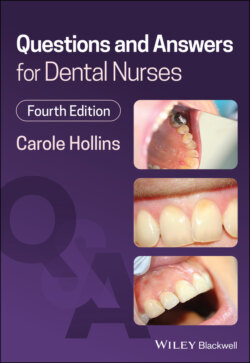Читать книгу Questions and Answers for Dental Nurses - Carole Hollins - Страница 13
Objective Structured Clinical Examination
ОглавлениеFor the sake of completeness, an overview of the practical element of the National Diploma examination is given here to assist candidates in readying themselves for the final part of the examination. More detailed information is given in the textbook Levison’s Textbook for Dental Nurses 12th Edition. The OSCEs are usually held several weeks after each round of written examinations has been completed, with only those candidates who pass the written section being eligible to then enter for the OSCEs.
The OSCEs provide an accurate and fair assessment of all candidates while carrying out various practical or clinical tasks. As the full name suggests, the examination style is both objective and structured in the way that candidates are assessed while undertaking OSCEs. The examiner does not ask any questions of the candidate during each section of the examination (so they are objective and not subjective, or rather, not based on the examiner’s opinion after having asked the candidate any random questions), and the examiner grades each candidate’s practical/clinical performance against set criteria as they carry out the required task. The set criteria are exactly the same for every candidate at whichever examination centre they attend and are followed by every examiner, so the OSCEs are a structured examination.
Each examination sitting will have up to 15 OSCE stations that every candidate must go through, and they are usually timed at 5 minutes each. Other than to welcome candidates to each test area and ask if they have read the ‘candidate instructions’ for the individual test beforehand, the examiner does not speak to the candidate but merely observes their performance within the 5‐minute timing.
There are four general types of practical assessment that the OSCEs will cover, and each is designed to test both the professional and practical skills of the candidate.
Communication skills – such as giving specific oral hygiene advice or post‐operative advice to a patient (the patient will be a professional actor)
Medical emergency – such as an asthma attack scenario with a professional actor as the patient
Mixing skills – any dental material from within the NEBDN curriculum
Clinical skills – such as setting up instruments for a certain procedure or completing a charting exercise.
The candidate instructions will state the scenario relevant to the OSCE station, and the candidate is able to read these instructions before the 5‐minute timing starts. The instructions will be clear and concise, so that the task to be carried out by the candidate will be obvious to them. Where a patient (actor) is involved in the scenario, the candidate will be scored objectively by both the examiner and the patient for that OSCE station.
To ensure that every candidate is assessed objectively, the following system is strictly followed.
Every examination centre will carry out exactly the same OSCE assessments, using exactly the same resources.
All candidates and patient instructions will be worded exactly the same, in every examination centre.
All candidates will be marked against the same performance criteria and in the same way, as the examiners have been trained and calibrated to each other.
All candidates will rotate through the OSCE stations in a set order until they have completed the full cycle.
A single timer is used for each cycle of stations (usually a bell), so candidates cannot have too little, or too much, time at any station.
All candidates are allowed 1 minute to read the scenario and candidate instructions for each station, before entering the station and beginning the assessment when the bell rings.
No candidate is allowed to enter the station until the start of the 5‐minute assessment period.
The candidate may repeat the assessment within the 5‐minute time period if they wish.
The examiner will not ask any questions of the candidate.
Candidates may carry out a practical task while talking their way through it if they wish (some candidates may find this helps to focus their actions), but they will only be assessed on the performance criteria listed on the examiner mark sheet and not on anything they say.
There are no ‘killer’ stations, where the candidate must pass that one station or be failed for the whole OSCE examination.
